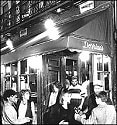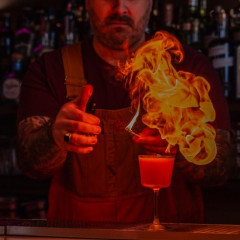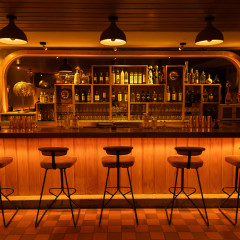 We'll admit it: we never thought we'd see Annabel Vartanian and Rock Hudson discussed in the same article. But that's exactly what happens in Spencer Morgan's entertaining, in-depth look at preppy mainstay Dorrian's Red Hand in the Observer.
We'll admit it: we never thought we'd see Annabel Vartanian and Rock Hudson discussed in the same article. But that's exactly what happens in Spencer Morgan's entertaining, in-depth look at preppy mainstay Dorrian's Red Hand in the Observer.
It's a delightfully schizoid article. It includes some great pearls from crusty owner Jack Dorrian. The Red Hand's success allowed him to put all eight (!) of his kids through private school. Why not public? "“What, am I gonna put ’em in with the dopes?!” As for Dorrian's educated revelers (we hear Harvard kids like it), Jack explains "if you have a group of college people in here, that’s what you’re going to get. The kids who are not college kids, they figure they’re lacking education, so they find some place else."
Then, there's a history of not only the Red Hand, but of Jack's father, James. James came over from Belfast in the '20s. We learn how Dorrian's got its name: everyone called James "Red." Red had bars all over the city. One of them was a discreet gay bar, the Wrinkle Room, whose clients, Jacks says, "weren’t faggots, they were gay." Rock Hudson used to wave money in the face of young hustlers there.
 Morgan continues with current analysis of Dorrian's. For one thing, "There are no hookers in here. No drug deals in here. No gambling." There might be room for debate on that one, but the biggest buzzkill comes from its realization of how watered down Dorrian's current crowd compared to a place like the is from a place like the Wrinkle Room.
Morgan continues with current analysis of Dorrian's. For one thing, "There are no hookers in here. No drug deals in here. No gambling." There might be room for debate on that one, but the biggest buzzkill comes from its realization of how watered down Dorrian's current crowd compared to a place like the is from a place like the Wrinkle Room.
Randomly, the place is big with people from Far Hills, New Jersey. Notable Sociables pretending to slum it also like Dorrian's:
“I think part of why it’s so hot right now is the recession and people not having cash and it being not a $20 cab ride away downtown,” said sociable gal Anisha Lakhani. “And then coupled with things like, you know, this is not Rose Bar where you have to get past someone or like ‘velvet ropes’, if you have an ID you can get in, basically. …”
It's also not the Boom Boom Room:
“The Boom Boom Room is the hierarchy”—every time he goes there he passes by a long, tragic line of plebes waiting to get to pay $25 for a drink—“and Dorrian’s is the democracy.”"
Still, the folks who usually crave that sort of exclusivity often pay a visit. Paul Johnson Calderon stops by and "pretends to play blackjack in the summer." "Topper Mortimer does a great version of the Boz Scaggs tune “'Lido Shuffle'” on Karaoke Tuesdays. For better or worse, "Annabel Vartanian doesn’t come very much, whatever that means." (It's a bit of an odd article.)
Jack admits the bar isn't what it used to be. And Morgan concurs: "Not, it's cornball." But the article concludes by saying that especially in New York, the more things change, the more they stay the same. That a New Yorker going to drink the night away in 2009 is trying to escape "the same problems" New Yorkers were fifty years ago.
As Jack puts it, "People come to New York, and if they don’t walk slowly after six months, they go back to where they came from."
We always thought people learned to walk quickly in New York, but if this grizzled vet tells us differently, we'll accept it.



.jpg)
.jpg)



.jpg)
.jpg)
.jpg)



(6).jpg)
